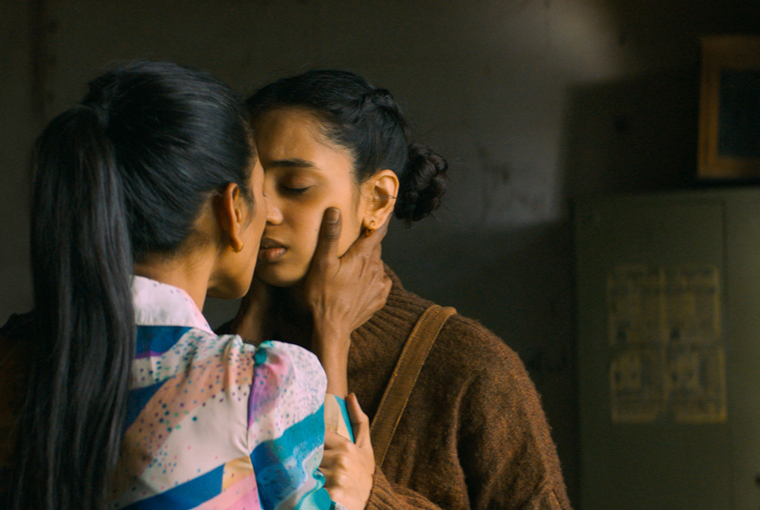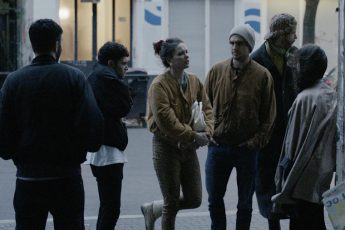The Lives of Others
Konstantin Bojanov’s The Shameless (2024)
Vol. 149 (November 2024) by Isabel Jacobs
Screened at the 2025 Trieste Film Festival, The Shameless opens in neon red and electric blue, evoking 2000s indie cinema. A man lies bloodied and panting on a bed, while a woman, knife in hand, counts money. She weaves through a messy Delhi brothel and vanishes into the night. The first scene sets the stage for the next 115 minutes, a disorienting fever dream of an imaginary India that flirts with cliché – maybe too heavily.
On the run after stabbing a police officer, Renuka, fiercely played by Anasuya Sengupta, flees into the anonymity of India’s underbelly. She seeks refuge in a devadasi (sex worker) community in Odisha where she meets Devika (Omara Shetty), a 17-year-old teenager with dreams of becoming a rapper. Renuka is a street-hardened, tattooed woman who smokes, drinks, and uses heroin – a total outsider in a traditional society. A chai seller scolds her for dressing in a Hello Kitty T-shirt and mini skirt: “This place has its own system.”
Attracted to the naive schoolgirl, Renuka lurs Devika into a lesbian romance. The bond between the two women develops into a relationship somewhere between love and grooming. Bojanov lets the ambiguity simmer. When offered passage out of India on a cargo ship for two lakhs, Renuka jokes: “How many dicks do I have to suck for this?” and instead buys a necklace for Devika.
Devika, on the other hand, watches American rap videos on her phone, penning lyrics like “Time passes by like sand / I have no bond with the sand.” She tapes her chest to deter sleazy clients. Together, Renuka and Devika spiral toward an impossible freedom: they eat ice cream and fantasize about escaping together. A cringe-worthy scene where Devika lip-syncs for Renuka on a rooftop is the igniting moment of their fatal attraction – predictably, with no happy end in sight.
Sengupta’s performance won her the Best Actress award at Cannes in 2024 but the characters feel a bit shallow. The attraction between the two women is artificial and trite. The queer subplot, supposedly central, unfolds entirely through a voyeuristic male gaze. Female agency is depicted as vengeful violence, with Renuka bordering on a caricature of the man-killing queer. Is it not just another fetishized trope repackaged for Western audiences? And whose story is this, really? Whose gaze are we actually following?
The Shameless is an experiment of playing with the outsider perspective while blending stylized representations of South Asia with Hollywood tropes (one of the main inspirations behind the character of Renuka was Charlize Theron in Monster). The director filtered his material through a lens that neither simply exoticizes nor completely resists a colonial gaze. The film gestures at weighty issues – right-wing radicalism, caste violence, mental health, heroin addiction, and the marginalization of LGBTQ+ people in India – yet treats them as aesthetic textures rather than the lived realities of society’s vulnerable.
The affinity with Sean Baker’s Anora, also lauded at Cannes, is striking: both are drawn to the raw existence of sex workers at the margins of society, playing with the motif of the ostracized and exploited ‘fallen woman’ that is also a Bollywood trope (think of Umrao Jaan). Where Anora wears its brash Trump-era Americanness on its sleeve, casting real sex workers, Bojanov tries to create the veneer of gritty authenticity the film never earns.
Even at its most tender, The Shameless is steeped in detachment. The Bulgarian filmmaker developed the story after traveling through India, researching a documentary based on William Dalrymple’s Nine Lives: In Search of the Sacred in Modern India (2009). Dalrymple, a prominent Scottish historian and travel writer, has faced critiques from decolonial scholars for imperial biases and a tendency to exoticize Indian culture. Unfortunately, The Shameless follows a similar path.
Bojanov pivoted the project to fiction due to linguistic and logistical challenges, ending up with a genre-heavy pulp tale shot entirely in Nepal. Bojanov’s outsider status as a European man portraying a lesbian love story between two Indian women is inevitably problematic. Instead of aiming for cultural authenticity, the director leaned into aestheticization, with the aim of transcending geographical specificity.
The Shameless draws heavily on stylized visuals, with contrasts of color and dreamlike sequences led by the motif of fire. In one chilling scene, Devika hallucinates her bedsheet soaked in blood while Renuka faces the wrath of a mob stoked by right-wing fervor – after all, she is named after a Hindu goddess, worshipped as a deity of the fallen who was beheaded by her own son.
In the end, the film doesn’t know what it wants to be. A critique of politics and misogyny in India today? A feminist fable? A queer love story? A social realist portrait of the underclass? It touches on all these threads but commits to none. It feels like just another Cannes-pleaser that lives up to its title – a shameless exploitation of the lives of others.




Leave a Comment